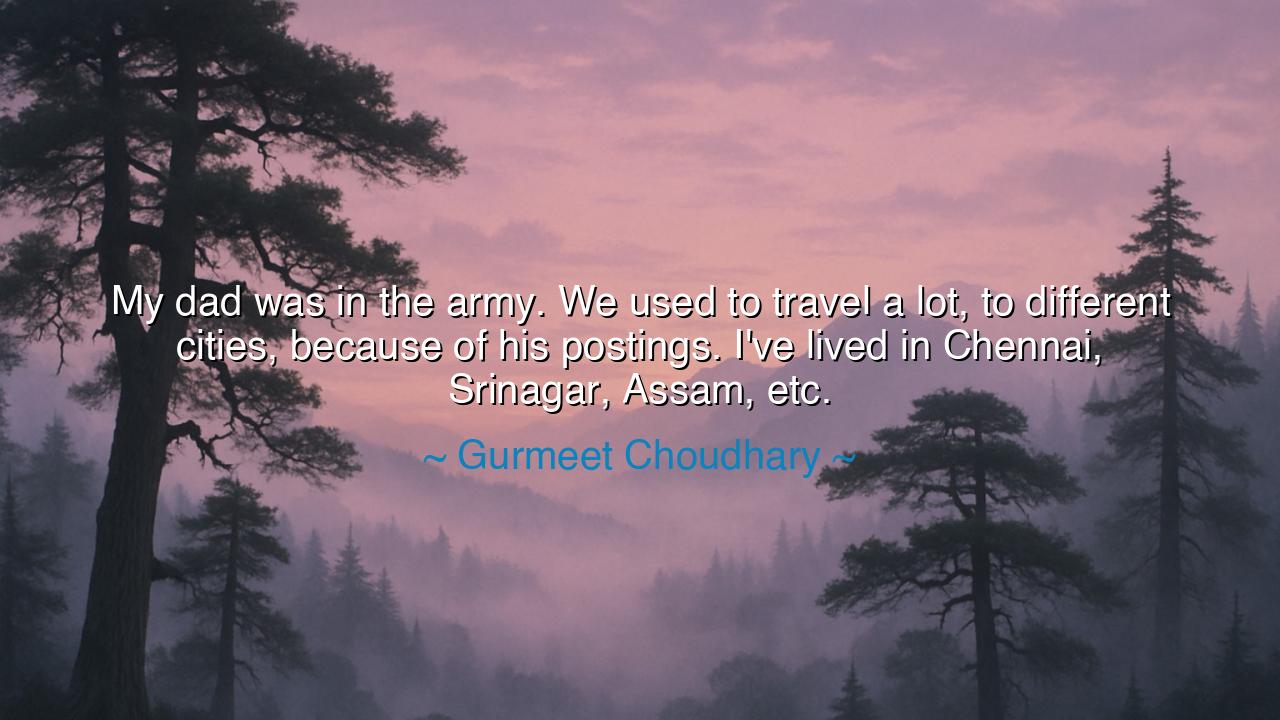
My dad was in the army. We used to travel a lot, to different
My dad was in the army. We used to travel a lot, to different cities, because of his postings. I've lived in Chennai, Srinagar, Assam, etc.






Hear the words of Gurmeet Choudhary, who reflected: “My dad was in the army. We used to travel a lot, to different cities, because of his postings. I've lived in Chennai, Srinagar, Assam, etc.” These are not merely the memories of a childhood spent on the move. They are a testament to a life shaped by duty, by movement, and by the wisdom that comes from being at home in many places, yet belonging wholly to none. Within these words lie lessons of adaptability, resilience, and the quiet strength of families bound to service.
The army is not only a profession, but a calling that shapes the lives of all within its orbit. A soldier bears arms, but his family bears the weight of constant uprooting. Each posting is a new beginning: a new city, a new language, a new set of neighbors, and new ways of life. To be a child of such a house is to learn early that permanence is an illusion, and that one must find strength not in the soil beneath one’s feet, but in the bonds of family, discipline, and inner character.
The act of continual travel across cities such as Chennai, Srinagar, Assam is more than geography. It is the shaping of a soul through diversity. Each place carries its own rhythm, its own flavor, its own wisdom. The one who has lived in many lands carries within himself a tapestry far richer than the one who has never left his village. Such a life may lack rootedness in one place, yet it grants a greater root: the ability to belong anywhere, and the gift of seeing the world through many windows.
This truth is reflected in history. Consider the life of Alexander the Great, who, though Macedonian by birth, traversed lands from Greece to India. In each place he learned, adapted, absorbed, and spread new ideas. His greatness lay not only in conquest, but in his ability to weave the cultures of the world into one empire. Likewise, the child who travels with an army father learns the art of adaptability—the power to live in Srinagar’s valleys as easily as in Assam’s plains. Such adaptability becomes the foundation of resilience in later life.
The sense of belonging is paradoxical in such lives. You belong everywhere and nowhere. Yet in this paradox is hidden strength. For the traveler learns to carry home within, to find constancy in the heart rather than in the walls of a single house. Gurmeet’s words carry the weight of this truth: that one’s identity is not tied to one land, but to the values instilled by family, by discipline, and by the experiences gained on the road.
The meaning, then, is clear: life’s continual movement is not a curse but a teacher. To those who travel often, let them see it not as loss, but as an opportunity to grow beyond boundaries. To those who remain in one place, let them remember that the world is larger than their walls, and that wisdom often comes from stepping beyond the familiar. The soldier’s child reminds us that change is not an enemy, but a guide.
The lesson for us all is this: embrace the unfamiliar. Learn to adapt as the soldier’s family adapts. Carry with you not possessions, but virtues that do not change with geography: kindness, humility, courage, gratitude. When life uproots you, let your roots grow inward, deep into character, rather than outward into soil. In this way, you will find belonging even when the land beneath your feet changes.
Therefore, children of tomorrow, remember the teaching of Gurmeet Choudhary: the road is long, and postings will come and go. Cities will change, homes will shift, seasons will pass. But if you learn to travel with grace, to adapt with strength, and to hold fast to the bonds of family and virtue, then you will discover that you are at home wherever you stand. For the true homeland of man is not one city or one country, but the steadfastness of the heart.






AAdministratorAdministrator
Welcome, honored guests. Please leave a comment, we will respond soon